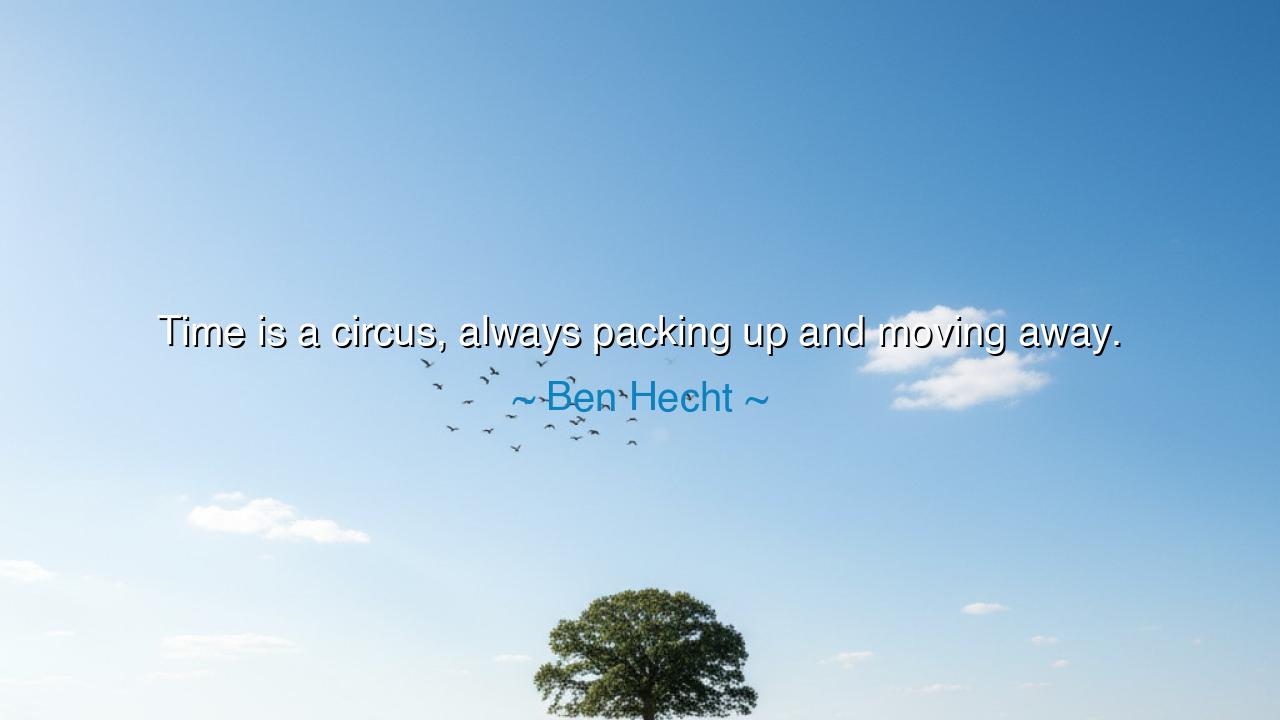
Time is a circus, always packing up and moving away.






The playwright and screenwriter Ben Hecht once declared, “Time is a circus, always packing up and moving away.” In this image he captured the fleeting, colorful, and restless nature of time. Like a circus, life dazzles us with moments of wonder, laughter, music, and spectacle. Yet just when we begin to grow accustomed to its sights, just when we think the show will last forever, the tents are pulled down, the lights are extinguished, and the wagons roll away into the distance. Such is the nature of time—never still, never rooted, always moving beyond our grasp.
The origin of this phrase lies in Hecht’s sharp and poetic observations of human existence. He was a man who lived amidst the glitter and transience of theater and film, where every performance is temporary, every applause fleeting, every curtain destined to fall. His metaphor of the circus reflects this truth: that no matter how grand the spectacle, it cannot linger. Time refuses permanence. It does not stay to comfort us in joy, nor pause for us in sorrow. It is always breaking camp, always beckoning us to move on.
History shows us this wisdom in countless ways. Think of the grandeur of ancient Rome, where the Colosseum roared with the voices of thousands, and emperors believed their glory eternal. Yet Rome too was a circus—magnificent in its moment, but destined to pack up and fade into ruins. The banners of empire were lowered, the armies dispersed, the marble crumbled. What once seemed everlasting was revealed to be as fleeting as the circus lights. Time moved on, leaving only memory and broken stone as testimony.
And yet, there is also beauty in this truth. The circus does not vanish to mock us, but to remind us that life’s moments are precious precisely because they are temporary. Consider the life of Anne Frank, who in her brief years witnessed both terror and hope. Her diary, written in the hidden attic, records not only suffering but also laughter, dreams, and the small joys of daily life. Her circus of time was short, yet within it shone the brilliance of humanity. Even as her tents were struck too soon, her words remind us that every moment of the show matters.
The deeper meaning of Hecht’s words is this: we must learn to cherish the spectacle while it is here, for it cannot last. Too often, men and women believe the circus will stay—that youth will linger, that opportunities will return, that love will wait forever. But time will not stand still for us. If we fail to marvel while the lights are burning, we will find ourselves staring at empty fields, haunted by what we missed. The circus moves on whether we are watching or not.
The lesson is to live with urgency and presence. Do not wait for another show, another season, another chance to speak or act. This moment is the performance before you. Applaud it. Participate in it. Treasure it. For once the tents are folded, you cannot summon them back. Learn to hold your loved ones closely, to speak your truth, to chase your dreams before the wagons roll away.
Practically, this means cultivating the art of mindfulness and gratitude. Take time each day to notice the circus around you—the laughter of children, the song of birds, the shared meal, the conversation with a friend. Do not be lulled into thinking these things will always be here. Guard your hours as sacred, and give yourself wholly to them. For in honoring the moment, you honor the very essence of life itself.
So remember, children of the future: time is a circus, always packing up and moving away. You cannot hold it, you cannot halt it, but you can witness it in all its color and wonder before it passes. Live as one who delights in the spectacle, who rises to cheer before the curtain falls, who leaves the field not with regret but with gratitude for the show. For though the circus may move on, the memory of how you lived within it shall remain eternal.






AAdministratorAdministrator
Welcome, honored guests. Please leave a comment, we will respond soon